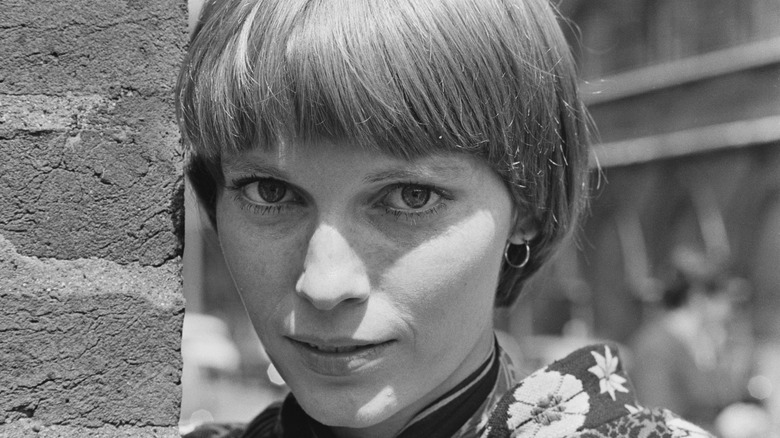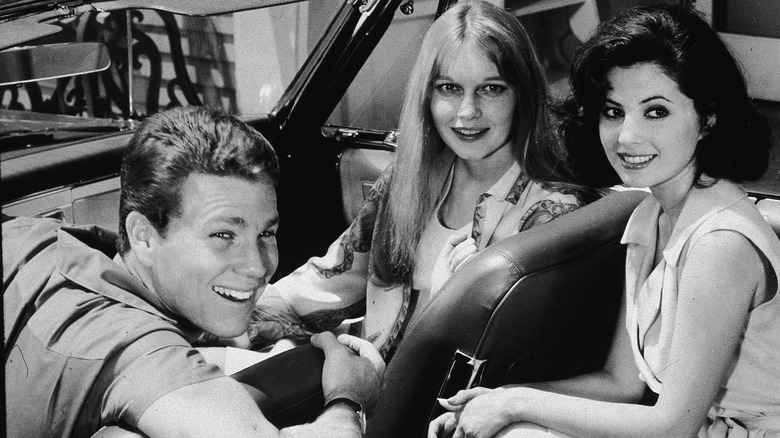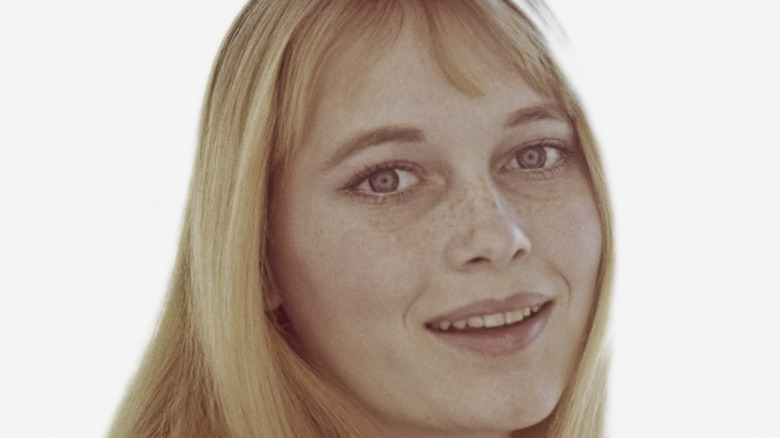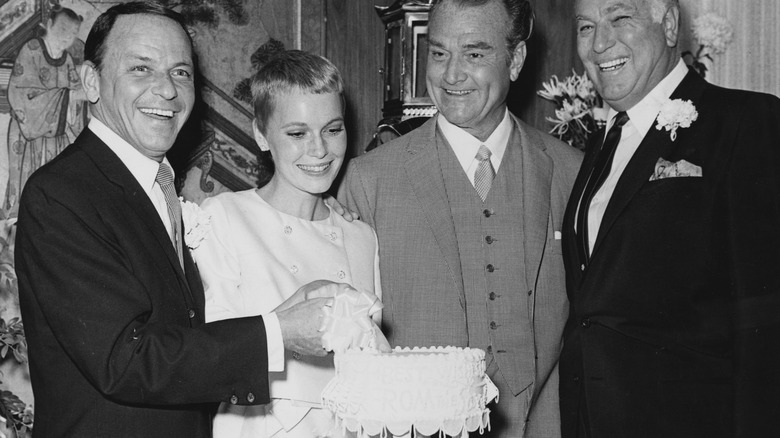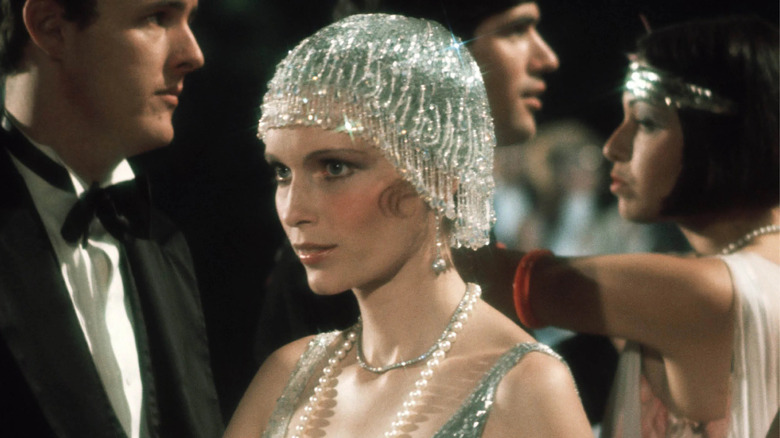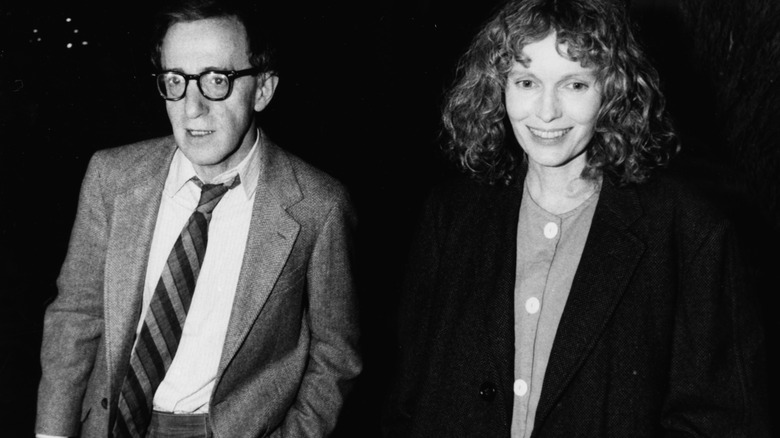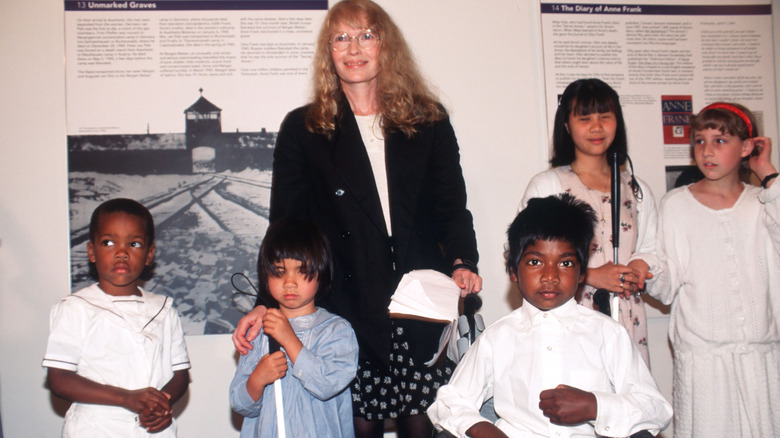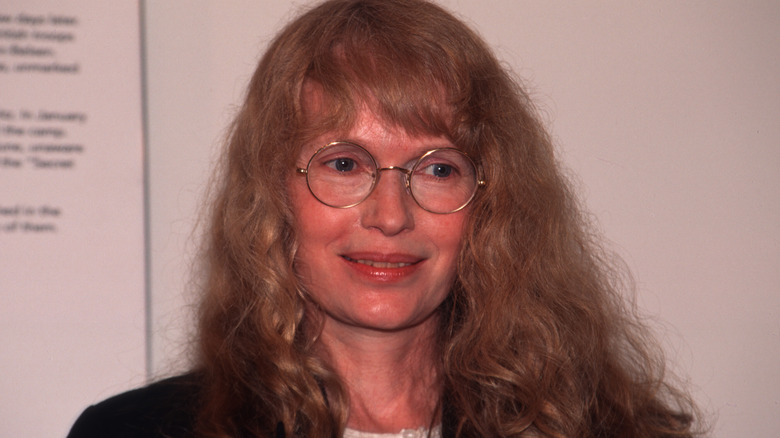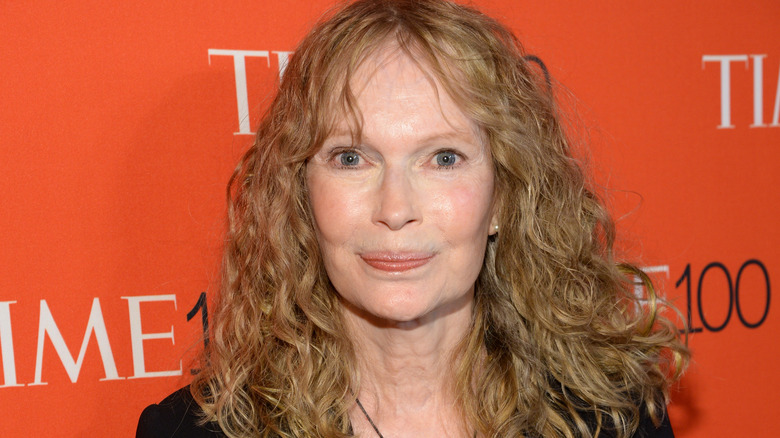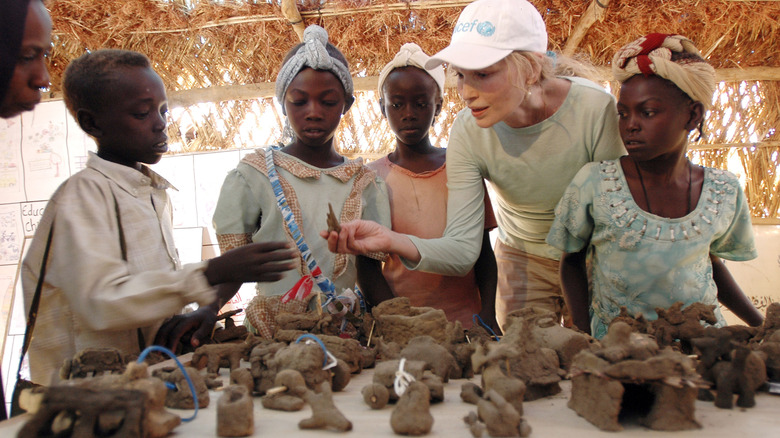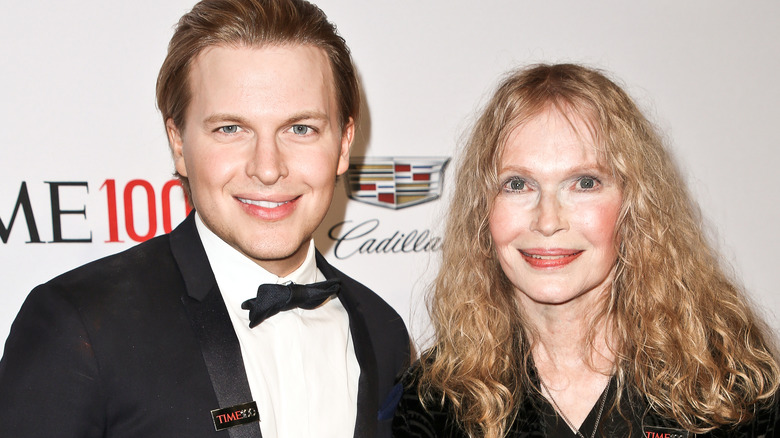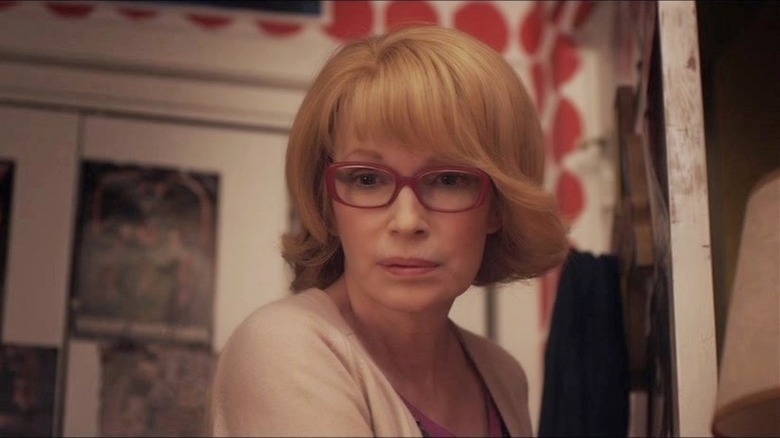The Untold Truth Of Mia Farrow
We may receive a commission on purchases made from links.
Mia Farrow grew up in show business — her father was a writer/director and her mother was a famous actress — and it always seemed like she was destined for stardom. Farrow's career kickstarted into high gear when she was a young adult, starring in "Peyton Place" and at age twenty-three, she followed up with a breakthrough role in "Rosemary's Baby."
Through the years, Farrow has proven her versatility, working in nearly every medium and genre. Farrow has also raised fourteen children, ten of them adopted, and more than anything is committed to making the world a better place.
The '70s brought notable roles in films like "The Great Gatsby" (alongside Robert Redford) and "Death on the Nile" (opposite Peter Ustinov, Better Davis and more), the '80s were almost entirely consumed by a work/life relationship with Woody Allen that would yield such classics as "Zelig," "The Purple Rose of Cairo" and "Crimes and Misdemeanors," and ensuing decades came with a balance of work life, activism, and a headline-making acrimonious split with Allen.
Mia Farrow's untold truth is a tale about an actor who has endured multiple decades in Hollywood, shared lives with the biggest names in entertainment, and whose own story is every bit as compelling as any she's helped depict on a screen.
She grew up in Hollywood
Thousands of actors have made their way to Hollywood to pursue their dreams, but Farrow grew up inside the business. Her father John was a successful writer and film director, and her mother was the actress Maureen O'Sullivan, who led a prolific career and is best known for her role as Jane in six different "Tarzan" films and also appeared in the original "The Thin Man." Farrow grew up surrounded by celebrities, from gossip columnist Louella Parsons (who became her godmother) to "Little Rascals" film producer Hal Roach, who was the father of Farrow's childhood best friend.
Farrow's childhood might have been imbued with movie magic, but that didn't mean it was without difficulty.
"I think [Hollywood] was a difficult place for children," she told The Guardian in 2006. Most everyone Farrow knew was tied into the movie business in some way or another, and she came to believe that was "limiting in the way that role models were presented to children."
Ultimately, it would pave the way for her own stardom. Farrow began her acting career at age 18, as a cast member on the TV series "Peyton Place" (pictured above). Soon, she would make the leap to the big screen.
She had polio as a child
Sometimes, the most difficult part of a person's childhood shapes their outlook on life. For Farrow, that early life-changing moment came when she caught polio at age 9, before a vaccine had been fully developed.
She told The Guardian that the illness "marked the end of my childhood," but said that it also gave her "survival skills" she might not have otherwise developed. Farrow spent months separated from her parents and her six siblings. She lived in an isolation unit at Los Angeles General Hospital, all the while wondering how severely the illness would end up affecting her.
Luckily for Farrow, her bout of polio didn't leave her with any long term physical damage. Still, the months she spent in the hospital made a lasting impression on her life. She published her autobiography "What Falls Away" in 1997, and the book opens with a description of her illness and the time she spent in the hospital. When she wrote the book, Farrow's entire view of her life was filtered through the lens of that traumatic experience, as well as the fear of possibly infecting her family.
Her relationship with Frank Sinatra began at age 16
Farrow was famously married to Frank Sinatra in 1966. She was 21-years-old at the time, but they had already been in a relationship for several years by that point.
According to The Guardian, when Farrow was just 16 years old, Sinatra sent his private jet to pick up her and her deaf cat Malcom for a trip to Palm Springs. Sinatra was in his mid-40s at the time, but despite the age gap, the two continued seeing each other until they decided to get married.
Unfortunately, their marriage was short-lived. Farrow was working on "Rosemary's Baby" when the couple divorced. Sinatra wanted Farrow to leave the production to come work on his film "The Detective." When she refused, he sent divorce papers to the film set.
Years later, an interview for Vanity Fair asked Farrow if she believed the two would have stayed together if she'd gone along with him. "Yes, she said. "Because then he came back, over and over and over and over."
According to Farrow, the two of them continued to see each other, off-and-on, for the rest of Sinatra's life. She even said in the interview that her son Ronan was "possibly" Sinatra's child, not Woody Allen's, to which the investigative journalist tweeted: "Listen, we're all *possibly* Frank Sinatra's son." It is a suspicion that continues to garner speculation to this day.
She was pregnant while filming The Great Gatsby
Mia Farrow continued developing her acting career after divorcing Sinatra, but her life was about to go through even more dramatic changes. In the years that followed, Farrow met André Previn, a German-American composer and conductor, and in 1970 they were married. Farrow moved to Surrey, England to live with Previn, and it wasn't long before their minds turned to children.
Over the ensuing eight years, the Farrow-Previn household tripled in size. The couple adopted three children together: Daisy, Lark, and Soon-Yi Previn. They also had three biological children: twins Mattew and Sascha in 1970, and son Fletcher four years later.
During this time, Farrow acted in some of the most significant films of her career, even being pregnant with Fletcher while filming 1974's "The Great Gatsby." The marriage ultimately didn't last; Farrow and Previn divorced in 1978. However, the two remained on good terms, and motherhood would come to play a huge part in the rest of Farrow's life.
Her relationship with Woody Allen ended acrimoniously
Farrow's relationship with Woody Allen would soon become one of the most intensely public aspects of her life. After divorcing Previn, Farrow moved back to the United States, and in the 1980s she started a relationship with the filmmaker marked not just by romance but also creative collaboration.
In one of the busiest sections of Farrow's acting career, she starred in 13 of Allen's films. Along the way, the couple adopted several children and had a biological son, Ronan (named Satchel at birth, after baseball player Satchel Paige). Despite the intensity of their relationship, Farrow and Allen lived in separate apartments and never married.
"He never wanted to be married to me," Farrow explained in 1994. "He said he didn't believe in it — it's just a piece of paper."
In the early '90s, their family was torn apart. In January of 1992, Farrow discovered naked pictures of Soon-Yi, then in her early 20s, at Allen's apartment. Although their relationship ended there, Allen still had permission to visit with his adopted children — and on August 4, 1992, an encounter occurred which has since haunted the lives of all involved.
In November 2013, Vanity Fair published a piece that for the first time had a now-adult Dylan Farrow going on the record about allegations of sexual abuse. Ronan has since publicly offered his support. In the years since, various legal battles, tell-alls and documentaries have kept those involved in the public spotlight, Allen was never found guilty of molestation and married Soon-Yi in 1997, and Farrow moved her family to Connecticut. Decades later, the accusations remain a controversial, muddled mess.
She has raised 14 children
Mia Farrow's family has continued to grow exponentially; in addition to her four biological children, she's adopted ten kids. She adopted her first three children — Lark, Daisy, and Soon-Yi — while she was married to André Previn. On her own, she has continued to bring more children into her family, many of whom have had various special needs.
"I've often thought how presumptuous I was — to assume that I could be good enough to be the person that all of them need," she told the Guardian in 2006. "It's a philosophical question: if you walk by a pond and there's a baby drowning, are you allowed to walk by the pond? Well, people are walking by the pond all the time."
Describing those moments when the family grew, Farrow's oldest son Matthew told Vanity Fair, "I can't remember votes, but I remember certain robust discussions." Growing up in such a diverse, expansive family, the older kids were relied upon to help out around the house, while Farrow remained a very hands-on parent. In 1994, she told The New York Times, "I've been picking up Legos for twenty-three years."
Raising 14 children meant that Farrow had to put her career on the backburner at times, but she says it hasn't bothered her. "There's very few things in my life that I regret," she told Independent in 2006. These days, Farrow's children are grown up, but her grandchildren give her plenty of opportunities to keep her mothering skills sharpened.
She has repeatedly faced loss
Farrow has put a lot of goodwill into the world, particularly impressive for someone who has faced more than her share of loss. Not long after Farrow contracted polio as a child, her oldest brother Michael died in a plane crash; he was only 19 at the time.
When Farrow herself was 18-years-old, her father died of a heart attack, causing her to pick up some of the responsibility for providing for the family — perhaps planting a seed leading her to later become a mother for so many kids in need.
The family Farrow has overseen as a mother has also faced its share of tragedies. Her Vietnamese daughter Tam died in 2000; Mia Farrow would remember Tam in 2021 as having "passed away at 17 from an accidental prescription overdose related to the agonizing migraines she suffered, and her heart ailment."
As for Tam's older sister (who died in 2008), Farrow wrote: "My daughter Lark was as extraordinary woman, a wonderful daughter, sister, partner and mother to her own children. She died at 35 from complications of HIV/AIDS, which she contracted from a previous partner. Despite her illness she lived a fruitful and loving life with her children and longtime partner. She succumbed to her illness & died suddenly in the hospital on Christmas, in her partner's arms."
Lastly, in 2016, Mia Farrow lost the son she had adopted from Calcutta. "My courageous son Thaddeus was 29 and happily living with his partner," she wrote. "We were all anticipating a wedding, but when the relationship abruptly ended, he took his own life."
Regarding the deaths of her three children, Farrow referred to them as "unspeakable tragedies."
Her faith is very important to her
Farrow's parents were Catholic, and growing up she attended Catholic school for thirteen years (via Independent). Today, she still turns to her upbringing when life gets rough.
"If you're brought up a Catholic and you've had 13 years of convent education with nuns, there's no way you ever get out from under that," she explained in 2006, referencing a pendant of Our Lady of Perpetual Help given to her by her father when she was 12 that she still wears to this day. "I've accepted that fact about myself so there are certain things – like my lost saint – that sometimes are not so lost."
"My faith has helped me through many difficult times," Farrow added. "It made me understand what it is by that which cannot be taken away. The essential self that is yours and yours alone cannot be taken away. Only you can give it up."
While raising her children, Farrow introduced them to such religious notions, but stopped short of tying her own family to Catholicism. "At home I expose my children to all faiths," Farrow added. "I put a different book on the stairs leading up to our bedrooms — books on Judaism, Islam, Hinduism, Christianity and so on. I want them to get a taste of different religions and see how different people approach things and what their motivation is."
In her personal life, Farrow hasn't been shy about criticizing aspects of organized religion when she felt it necessary. "[The church is] so biased against marriage equality and intolerant, that's the part of the church that I feel that if everyone isn't welcome, it's very — it's as if I was going to a country club and they said well, this person can't come because they are Black or because they are Jewish or because they are gay," she told Piers Morgan in 2013 upon the ascension of Pope Francis. "I wouldn't feel comfortable going. And that's the problem I'm having with my church right now."
She's a human rights activist
For decades, Farrow has been working around the world as a human rights activist, being named a Goodwill Ambassador by UNICEF in 2000. Mirroring her personal life, Farrow's activism has been intensely focused on helping children, particularly in war-torn countries like the Democratic Republic of the Congo or areas like Haiti which have been struck by natural disasters. In 2007, Farrow's work in the Central African Republic earned her a Presidential Medal of Honor.
Much of Farrow's work has involved raising awareness and money for important causes or different organizations that offer humanitarian aid. She's also worked on the ground in places like Darfur, where she's come face-to-face with just how violent people can be (via Independent). She's not afraid to get directly involved in dangerous situations if it means potentially helping others. Once, she even offered to trade places with a rebel leader in Darfur in exchange for him getting the medical attention he required. In the last several decades, Farrow's work as a humanitarian and activist arguably eclipsed her Hollywood career.
She's worked in activism alongside her son
Mia Farrow's son Ronan has been particularly inspired by his mother's work as an activist. At an early age, he began following in Farrow's footsteps and became a UNICEF Spokesperson for Youth.
Farrow and her son have worked side-by-side on multiple humanitarian causes, and in 2008 Refugees International presented the two of them with the McCall-Pierpaoli Humanitarian Award. Their work together has even led the two of them to co-write op-eds urging greater support to the causes they care about.
"It's an unusual thing to do with one's mother, and very often we disagree," Ronan told Vanity Fair in 2013. "But I love working with her,"
In recent years, Ronan Farrow's reporting on the #MeToo movement has helped to further push him into the public eye. He broke the story of Harvey Weinstein's sexual abuse and while claiming he's "a reporter, not an activist," continues to have an impact that is largely based on his upbringing.
"You see early in life with that kind of a family background the way in which the most powerful men in America wield power for good and for ill," Farrow explained in 2018. "And probably, yes, the family background made me someone who understood the abuse of power from an early age ... I didn't want to confront this. I wanted to move on."
She's never given up acting
Much of Mia Farrow's life has been committed to raising her children and supporting humanitarian causes around the world. Sometimes that's meant she has needed to set aside her acting career, but to hear her tell it, that hasn't been much of a sacrifice.
Farrow told Independent in 2006 that one of her only regrets is passing up the opportunity to star in John Wayne's 1969 adaptation of "True Grit." Beyond that, she's always found a way to do just as much acting as she wanted, including stepping on the stage for an off-Broadway play in 2006 when she still had a house full of kids.
As for her three marriages? "Maybe two-thirds of them I wouldn't change," she said. "They were very good and we remained good friends. You figure it out."
Her movie appearances slowed down in the '90s and early 2000s, but she has not disappeared from the big screen entirely. Between 1991 and 2011, she appeared in more than a dozen projects while also working as a single mother and traveling around the world helping people in need. Now in her late 70s, she is next scheduled to make an appearance in the Netflix Ryan Murphy miniseries "The Watcher."
